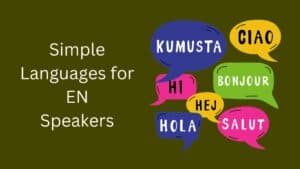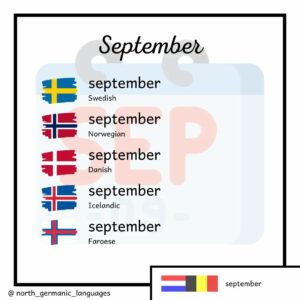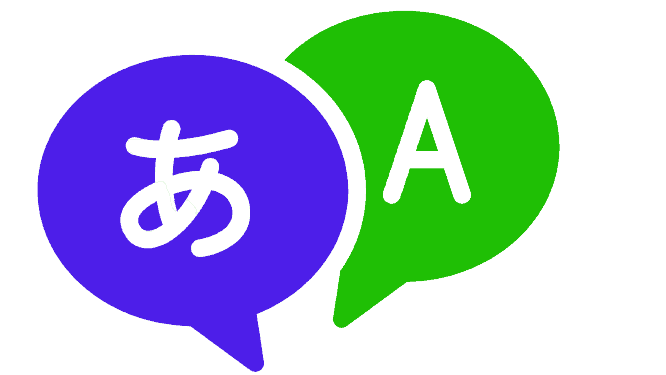Learning a new language can be hard and beneficial, but it can be particularly scary for English speakers. They are used to a language that is widely spoken and used in business, education, and entertainment. But many other languages are comparable to English, making it simpler for English speakers to learn them. This article will discuss some easy languages to learn for English speakers, with provide recommendations.

What language is easiest for English speakers to learn? (Ranked)
| Language | Difficulty | Reasons for Ease of Learning |
|---|---|---|
| Spanish | Easy | Similar grammar, pronunciation, and vocabulary to English. |
| French | Easy | Many cognates (words that are similar in both languages) and straightforward grammar. |
| Italian | Easy | Pronunciation and grammar are relatively simple. |
| Portuguese | Easy | Pronunciation is straightforward, and many words are similar to Spanish. |
| Dutch | Easy | Pronunciation is easy, and the grammar is similar to English. |
| Norwegian | Easy | Many cognates with English and a simple grammar system. |
| Swedish | Easy | Pronunciation is relatively easy, and the grammar is straightforward. |
| Danish | Easy | Pronunciation and grammar are relatively simple. |
| Indonesian | Easy | Simple grammar and straightforward pronunciation. |
| Esperanto | Easy | Designed to be easy to learn, with a straightforward grammar system and regular spelling and pronunciation. |
Romance languages (Spanish, French, Italian, Portuguese, Romanian)

If you’re an English speaker searching for a simple language to learn, consider romance languages. These languages are simple to learn if you already understand English since they have a similar history and grammatical structure.
- Spanish: It is one of the most commonly spoken languages in the world, with more than 500 million native speakers. It features a simple grammatical structure with a large vocabulary of English cognates.
- French: With a long history and widespread use, French is another common Romance language. It is simple to learn for English speakers since it has numerous cognates with English and a comparable grammatical structure.
- Italian: Italian has a melodious tone and is a lovely language. It has numerous parallels to both Spanish and French, including a vast lexicon of English cognates and a comparable syntax.
- Portuguese: Portugal, Brazil, and a number of African nations all speak Portuguese as their official language. Its syntax is comparable to Spanish’s, and it contains numerous English cognates.
- Romanian: The sole Romance language spoken in Eastern Europe is Romanian. It has a distinctive history and culture and has a lot in common with other Romance languages. It has a comparable syntax and a vocabulary rich in English cognates.
Germanic languages (Dutch, Norwegian, Swedish, Danish)

Another excellent choice for English speakers wanting to brush up on a simple language is the Germanic family of languages. These languages have numerous grammatical, vocabulary, and sentence structure similarities to English.
- Dutch: Over 23 million people worldwide, mostly in the Netherlands and Belgium, speak Dutch. It is quite simple for English speakers to learn. This is because it has numerous cognates with English and shares its structure of grammar.
- Norwegian: Around 5 million people worldwide, predominantly in Norway, speak Norwegian. It has a straightforward grammatical structure and several features in common with English, such as a large cognate vocabulary.
- Swedish: Over 10 million people speak Swedish across the globe, mostly in Sweden. It is among the easiest foreign language for English speakers since it has an identical grammatical arrangement to English and has many related words.
- Danish: Over 5 million people globally, predominantly in Denmark, speak Danese. It has a huge vocabulary of cognates and many comparable features to English, including a similar sentence structure.
Other languages (Esperanto, Indonesian, Swahili)
Due to their grammatical structure, vocabulary, and availability of learning resources, English speakers may learn other languages outside Romance and Germanic.
- Esperanto: Esperanto is an artificial language developed in the 19th century. It serves as a second language for all people. It boasts a sizable global speaker population, a phonetic spelling system, and a straightforward grammatical structure.
- Indonesian: Over 43 million people worldwide speak Indonesian, which is the official language of Indonesia. It is simple to learn for English speakers because to its phonetic spelling system and clear grammatical framework.
- Swahili: Bantu language Swahili is largely spoken in Kenya, Tanzania, and Uganda in East Africa. Given that it has a straightforward grammatical structure and numerous vocabulary in common with Arabic and English, it is simple to learn.
Tips for learning an easy language
Embrace the differences
As an English speaker studying a simple language, it’s crucial to accept the contrasts between the two languages. Embrace the contrasts by following these suggestions:
Pronunciation: English doesn’t have many sounds that are common in simple languages. Accept the difficulty of perfecting these sounds’ pronunciation. Repeat after native speakers as you listen to them.
Grammar: A lot of simple languages have distinct grammars from English. Try to comprehend the language’s grammatical rules on their own terms rather than attempting to convert everything into English.
Vocabulary: The vocabulary of simple languages can include terms that are utterly foreign to English speakers. Try to study these terms in context and establish links to English words that have a similar meaning rather than feeling irritated.
Culture: Getting to know a new culture may be accomplished by learning a simple language. Try to understand more about the background, traditions, and culture of the language you are studying while embracing cultural diversity.
By embracing the distinctions between the two languages, you can pick up the language and culture faster and better.
Find a language partner or tutor

A good strategy to improve your language abilities is to find a tutor or language partner. The following advice will help you locate a language partner or tutor:
Language exchange websites: You may discover a language partner who is a native speaker of the language you are studying by using language exchange websites like Tandem or HelloTalk. For conversation practise, you may meet in person or communicate with your language partner online.
Language schools: Many language schools can assist you find a private teacher or provide tutoring services themselves. Find local language schools or think about signing up for an online language programme with tutoring.
Social media groups: You may meet other language learners or native speakers who are interested in practising with you by joining social media groups linked to the language you are learning.
Look for language meetups in your region or think about creating one yourself. These gatherings provide the chance to practise speaking in a relaxed and encouraging environment with other language learners or native speakers.
Online tutoring platforms: You can connect with a tutor who is a native speaker of the language you are studying on a variety of websites, such italki or Busuu.
Having a language partner or teacher can help you gather new vocabulary and grammatical rules, improve your speaking and writing abilities, and get cultural insights into the language you are studying.
Use resources designed for English speakers
It is advantageous to utilise materials created for English speakers while studying a simple language. You may utilise the materials listed here:
- Language learning apps: There are many language learning apps available that are designed for English speakers. Rosetta Stone, Babbel, and Duolingo are a few of the well-liked choices.
- Online courses: You may study a language at your own speed with the help of online courses like those provided by Coursera or Udemy. These courses appeal mostly to English speakers.
- Textbooks for learning a language: Textbooks for learning a language, such those in the “Teach Yourself” series, may provide a thorough introduction to the language’s grammar and vocabulary.
- Language exchange websites: Language exchange websites, such as Tandem and HelloTalk, can connect you with native speakers of the language you are learning for conversation practice.
- Language immersion programs: Immersion language courses, such as those provided by language schools or study abroad programmes, may provide you a thorough learning experience and improve your proficiency in the language.
Immerse yourself in the language
Immersing oneself as much as you can in a language is one of the best methods to learn it. Here are some strategies for learning the language completely:
Watch movies and TV shows in the target language: Look for films and television programmes in the language you are studying, and if necessary, watch them with subtitles. You will have a better understanding of the sounds, rhythms, and intonation of the language.
Listen to music and podcasts in the target language: This is a great approach to increase your vocabulary and listening comprehension abilities. You can also practice singing along to songs to improve your pronunciation.

Read publications, blogs, and books in the language of interest: You can enhance your vocabulary and grammar through reading. Start with picture books for kids and work your way up to more challenging reading.
Practice speaking with native speakers: Find native speakers of the language you are studying and practise conversing with them to improve your communication skills. You may utilise apps or websites for language exchange, or you can go to language exchange gatherings in your neighbourhood.
Visit a nation where the language is used: A great strategy to develop your language abilities is to immerse yourself in the culture where the language is used. You will get many of chances to speak the language with native speakers. Also, you get a chance to learn more about the culture that surrounds it.
By immersing yourself in the language, you will become more comfortable with it and improve your language skills more quickly.
Criteria for easy languages for English speakers
Similarities to English grammar
An identical grammatical structure is one of the criteria for simple languages for English speakers. Learning languages with comparable grammatical rules to English may be simpler since students have a base to build on. For instance, the subject-verb-object word order and the usage of gendered nouns are parallels in syntax between English and Romance languages including Spanish, French, Italian, Portuguese, and Romanian.
Similarities to English vocabulary
English speakers find languages easier if they share vocabulary. Learners might find it simpler to recognise and comprehend unfamiliar terms if their native tongues share a lexicon with English.
For instance, numerous cognates, or terms having the same or similar meanings in both languages, exist between English and Germanic languages including Dutch, Norwegian, Swedish, and Danish.
Availability of learning materials
The accessibility of educational resources is a crucial factor. Learners may find it simpler to locate the assistance they want to study a language if the language has a plethora of resources, including books, online courses, and language learning applications.
Phonetics and pronunciation
It’s crucial to take into account pronunciation and phonetics. Learners can read and speak words more easily in languages with comparable sounds or alphabets to English. Also, languages with phonetic writing systems, where words are written the way they sound, can help people learn and remember new words.
Is Dutch the easiest language to learn for English speakers?
Many language experts say Dutch is an easy language for English speakers to learn since it has a lot of vocabulary and grammatical parallels to English, as well as relatively simple pronunciation.
Additionally, the majority of Dutch people are fluent in English, which might facilitate conversation for English speakers studying Dutch. But it’s important to remember that learning a new language takes time, work, and commitment, no matter how similar it is to your native language.
What are the easiest language for English speakers to pronounce?
In general, languages with clear orthography—that is, with predictable word pronunciation based on spelling—are simpler for English speakers to pronounce.
Spanish is one example of a language that is simple for English speakers to pronounce. It features a straightforward number of consonants and a regular set of vowel sounds.
It makes it reasonably simple to pronounce words properly. Spanish is also simpler for English speakers to sound out new words since Spanish words are often spoken exactly as they are written.
Italian, Portuguese, and Swedish are additional languages that are often regarded as being simple for English speakers to pronounce. These languages also have consistent spelling and relatively straightforward pronunciation norms. It’s crucial to remember that a person’s unique accent, intonation, and pronunciation can still make learning a language difficult.
What are the easiest Asian language for English speakers?
Some Asian languages that English speakers find simple to learn are:
- Indonesian: It has a basic grammatical structure and an easy pronunciation system, making it a reasonably the easiest Asian language for English speakers to learn. Furthermore, a lot of Indonesians are proficient in English, which makes it simple for English speakers to converse with native speakers while they are learning.
- Malay: In terms of grammar and pronunciation, Malay is another language that is comparable to Indonesian. It is also a helpful language for travel and commerce since it is widely spoken. (Notably in Malaysia, Indonesia, Singapore, and Brunei).
- Vietnamese is a tonal language, which means that a word’s meaning may vary depending on the pitch at which it is uttered. However, it is simpler for English speakers to master because to its basic pronunciation system and simple grammatical system.
- Korean: Compared to other Asian languages, Korean is simpler for English speakers to learn due to its easy syntax and plain pronunciation system. A popular language to study for individuals interested in Korean music, movies, and television dramas is Korean, which has a rich and varied culture.
Conclusion
In the end, Esperanto, Indonesian, Swahili, and other languages from the Romance and Germanic families are among the simple languages that English speakers can easily learn.
It’s crucial to appreciate the contrasts between English and the language you’re studying. Immerse yourself in it, and utilise materials written for English speakers while learning an easy foreign language.
Finding a language partner or instructor may also be a good method to develop your language abilities and get insightful feedback. English speakers may learn a new language and comprehend a foreign culture better by heeding these suggestions and accepting the contrasts.
FAQs
Spanish, French, Italian, Portuguese, Dutch, Norwegian, Swedish, Danish, Esperanto, Indonesian, and Swahili are some simple languages for English speakers.
Because of their similarity to English in terms of syntax, vocabulary, and sentence structure, these languages are simple for English speakers to learn.
There are many resources available to help you learn an easy language. Use language learning apps, online courses, language exchange websites, language immersion programs, and language learning textbooks.
The period of time it takes to learn a simple language depends on a number of variables, including your degree of commitment, the tools you use, and how much practice you do. You can attain basic proficiency by some persons in a matter of months, while it may take a year or more for others.
Yes, understanding the alphabet of the language you are studying is essential if you want to be able to read and write in that language.
Travelling is not essential to learn an easy language, however exposure in the target country might be beneficial. You can learn a lot by using the many online and offline resources accessible.
Learning a simple language can help you in many ways, like getting a better job, travelling more, learning more about other cultures, and making your brain work better.
Spanish, French Italian, Portuguese, Dutch are easy foe Americans.
Spanish, Italian, Portuguese, Swedish, Norwegian are simple to learn for Europeans.

Meet Bill, a French language teacher and blogger who specializes in testing various language learning apps. He has been teaching French for nearly 4 decades and holds a Bachelor’s degree from Manhattanville College. With a passion for technology and how it can enhance language learning, Bill has spent years testing and reviewing different language learning platforms. His blog provides valuable insights into the pros and cons of each app, as well as tips for language learners of all levels.
